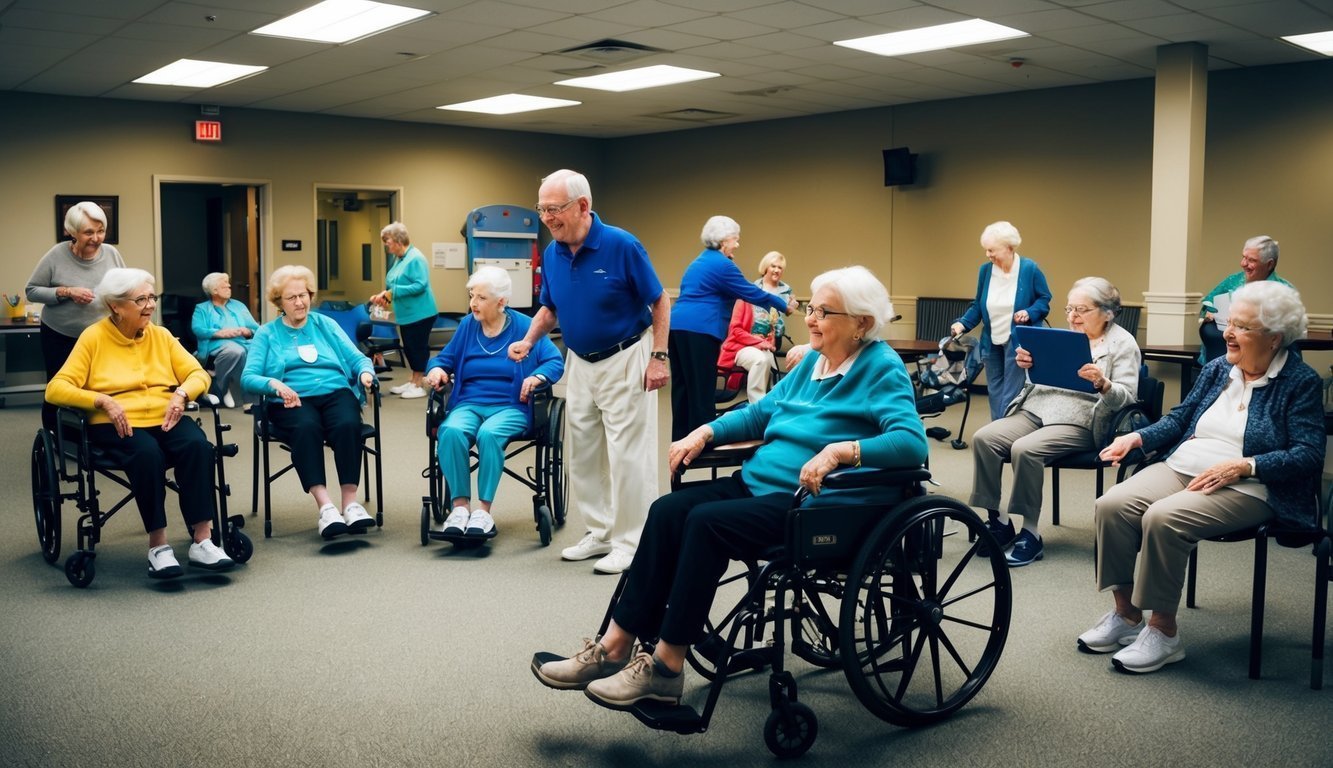PsychNewsDaily Publishers
100 Summit Drive
Burlington, MA, 01803
Telephone: (320) 349-2484
PsychNewsDaily Publishers
100 Summit Drive
Burlington, MA, 01803
Telephone: (320) 349-2484

Aging is an intricate journey shaped by biological, psychological, and social elements. It encompasses changes at cellular, physiological, and cognitive levels that significantly influence the health and well-being of individuals as they age.
On a biological level, aging is marked by senescence, which refers to the gradual decline of cellular functions. This phenomenon entails the buildup of cellular damage, a reduction in the efficiency of repair systems, and changes in gene expression.
The shortening of telomeres is a vital component in the aging of cells. As cells replicate, the protective telomeres at the ends of chromosomes shorten, ultimately resulting in cell death or senescence.
Additionally, oxidative stress plays a significant role in the aging process. Free radicals can inflict damage on cellular components like DNA, proteins, and lipids. With advancing age, the efficiency of antioxidant defenses diminishes, leading to exacerbated cellular damage.
Mitochondrial dysfunction is also a major contributor. These organelles, responsible for energy production, generate less energy and more harmful byproducts as they age, negatively impacting cellular health.
As individuals age, they experience notable psychological and social transformations. Cognitive abilities might decline, affecting memory, processing speed, and executive functions, while crystallized intelligence—wisdom and experience—may improve.
Social roles evolve as individuals retire, become grandparents, or face the loss of peers. These transitions can influence self-identity and levels of social participation.
Emotionally, older adults often exhibit enhanced regulation skills, tending to concentrate more on positive experiences while achieving greater emotional stability.
Subjective aging, which reflects how individuals view their own aging experience, profoundly affects psychological health and overall well-being.
Adapting to the changes that come with aging is vital. Successful aging encompasses the maintenance of physical and cognitive abilities, participation in fulfilling activities, and the preservation of social connections.
Life expectancy is shaped by an array of factors, including genetics, lifestyle habits, and environmental influences.
Genetic contributions to longevity are significant, as certain gene variations have been associated with increased lifespan and lowered risk of age-related ailments.
Lifestyle decisions also play an essential role in the outcomes of aging. Consistent exercise, nutritious diets, stress management, and social interactions all contribute to healthier aging.
Environmental aspects, such as exposure to pollutants and availability of healthcare services, further influence longevity.
Recent studies in epigenetics indicate that gene expression may be affected by environmental factors and lifestyle choices, potentially altering the aging trajectory.

As individuals age, certain health challenges become more common and require specific attention. Effectively managing chronic conditions, mental health, nutrition, and physical activity is essential for sustaining the quality of life in older adults.
Conditions such as heart disease, cancer, arthritis, and diabetes frequently emerge as major health concerns in older age. These issues often demand ongoing medical attention and lifestyle changes. Regular health check-ups and screenings become critical for early detection and management of these conditions.
Maintaining heart health is particularly crucial. Older adults are encouraged to monitor their blood pressure and cholesterol levels, alongside adhering to a heart-healthy lifestyle by avoiding smoking, limiting alcohol consumption, and managing stress.
As age increases, the risk of cancer also rises, making regular screenings for multiple cancer types—including colorectal, breast, and prostate cancer—essential for early intervention and treatment.
Cognitive health is a key concern for older adults. Conditions such as dementia and Alzheimer’s disease become more prevalent with age, necessitating prompt action at the first signs of cognitive decline.
Mental health issues, including depression and anxiety, can significantly impact older adults. These concerns may be overlooked or mistaken for typical aging effects. Regular mental health evaluations are crucial for preserving emotional well-being.
Engaging socially and participating in mentally stimulating activities can help sustain cognitive function. Activities such as puzzles, reading, and acquiring new skills benefit brain health.
A nutritious diet becomes increasingly vital as people age. Proper dietary choices underpin overall health, assist in managing chronic diseases, and support cognitive functioning. Older adults may require fewer calories but should prioritize nutrient-dense foods.
Essential nutrients for older adults include:
Staying hydrated is equally important, as the sensation of thirst may decline with age. Regular fluid intake helps avert dehydration and supports various bodily functions.
Engaging in regular physical activity is vital for promoting healthy aging. Exercise helps preserve muscle strength, balance, and flexibility, reducing fall and injury risks. It also enhances heart health, cognitive ability, and emotional stability.
Recommended types of exercise for older adults include:
Even light physical activities can yield meaningful health benefits. Before initiating new exercise programs, older adults should consult healthcare professionals to ensure safety and suitability.

Being mindful of daily habits can significantly affect the aging process. Embracing positive behaviors centered on nutrition, exercise, preventive care, and relaxation can facilitate longevity and improve overall well-being as individuals grow older.
A well-balanced diet is crucial for healthy aging. Consuming nutrient-rich foods provides vital vitamins, minerals, and antioxidants that bolster cellular health and cognitive functions. It’s beneficial to focus on including:
Minimizing processed foods, added sugars, and excessive salt can help lower inflammation and decrease the likelihood of age-related diseases. Staying hydrated is also key, as adequate fluid intake supports bodily functions and preserves skin elasticity.
Practicing portion control and mindful eating plays a significant role in achieving and maintaining a healthy weight, crucial for alleviating stress on joints and organs as one ages.
Physical activity is essential for upholding mobility and independence as individuals age. Regular exercise yields numerous advantages:
A comprehensive fitness plan should include:
Aim for a minimum of 150 minutes of moderate-intensity exercise each week, modifying intensity and duration based on personal health status and capabilities. Consistency is vital, as engaging regularly in physical activities supports cognitive function and minimizes chronic disease risks.
Proactive health management is fundamental for early detection and treatment of potential health issues. Routine health check-ups and screenings facilitate timely interventions and improved health outcomes. Key preventive actions include:
Keeping up with vaccinations is critical for preventing diseases, including annual flu vaccinations and other recommended immunizations for older individuals.
Fostering open dialogue with healthcare providers ensures tailored care that meets individual needs and risk profiles. Consistent monitoring of blood pressure, cholesterol levels, and other vital health metrics assists in the early identification and management of health challenges.
Quality sleep and effective stress management are integral to healthy aging. Sufficient rest allows the body to recuperate and regenerate, contributing to both physical and mental health. Strive for 7-9 hours of sleep nightly and cultivate a consistent bedtime routine.
Implementing stress reduction techniques can positively influence overall health:
Creating a calming nightly routine and optimizing the sleep environment can enhance sleep quality. Such strategies may include limiting screen exposure before bedtime, keeping the bedroom cool and dark, and investing in comfortable bedding.
Incorporating relaxation practices into daily activities aids in managing stress, thereby lessening the adverse effects of chronic stress on both physical and mental health as one ages.

As individuals age, they often encounter complex health and care requirements that necessitate specialized support systems. These challenges affect the physical and psychological well-being of older adults, prompting the need for comprehensive strategies to uphold their quality of life.
Disabilities are increasingly prevalent with age, impacting mobility, cognition, and independence. Many older adults require long-term care services to assist with daily activities. Employing assistive technologies and modifying residences can help sustain autonomy.
The psychological transition to long-term care facilities is crucial. Residents frequently face feelings of loss and isolation. Support groups and mental health resources are essential in aiding this transition.
Policymakers grapple with the necessity of providing affordable, high-quality long-term care options. Innovative solutions, such as aging-in-place programs, are being developed to accommodate the diverse needs and preferences of older adults with disabilities.
Chronic health conditions, including arthritis, diabetes, and heart disease, are common in older populations. These conditions often lead to persistent pain and discomfort that can compromise daily activities and mental health.
Implementing effective pain management strategies is fundamental. Such approaches may include:
Self-care becomes vital for managing chronic ailments. Older adults can benefit from education on symptom management, medication compliance, and lifestyle changes. Timely medical check-ups and screenings are critical for early interventions and treatment modifications.
Caregivers are instrumental in supporting aging individuals, offering crucial assistance with daily tasks, medication adherence, and emotional support. Nonetheless, caregiving can impose physical and emotional challenges.
Family caregivers frequently experience stress, burnout, and financial pressure. Access to support services, such as respite care, counseling, and educational resources, is vital for sustaining the well-being of caregivers.
Professional caregivers encounter challenges like heavy workloads and emotional exhaustion. Adequate training, fair remuneration, and pathways for career advancement are necessary to maintain a skilled and motivated caregiving workforce.
Innovative caregiving solutions, including technology-based monitoring systems and telehealth options, can enhance care quality and alleviate caregiver burdens, especially in rural or underserved regions.

With the global population aging, numerous programs and resources have been established to assist older adults. These initiatives aim to enhance life quality and tackle the specific issues faced by aging individuals.
Senior centers act as vital community hubs for older adults, providing social activities, educational programs, and health services that foster engagement and well-being among seniors.
The Older Americans Act delivers essential support through various services, including:
Mental health resources are crucial for aging individuals, with programs focusing on preventing and treating depression to support psychological well-being among older adults.
Alzheimers.gov offers extensive information and resources for caregivers and those affected by Alzheimer’s disease, providing insight into research, care planning, and support for caregivers.
Hearing impairment, a common challenge among older adults, is addressed through audiological services and assistive technologies designed to help seniors maintain communication and social connections.
Volunteer initiatives engage older adults in community service, encouraging active aging and social integration, contributing to improved mental health and cognitive abilities.
Health promotion programs emphasize the importance of establishing healthy habits among seniors, focusing on nutrition, physical activity, and preventive care to enhance overall wellness and longevity.
“`